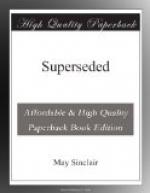“Attention indeed! I should be very sorry to let any young man suppose that I paid any attention to him. I should have thought you’d have had a little more maidenly reserve. Besides, you know perfectly well that I don’t enjoy my tea unless we have it by ourselves.”
Oh yes, she knew; they had been having it that way for five-and-twenty years.
“As for that cake,” continued the Old Lady, “it’s ridiculous. Look at it. Why, you might just as well have ordered wedding cake at once. I tell you what it is, Juliana, you’re getting quite flighty.”
Flighty? No mind but a feminine one, grown up and trained under the shadow of St. Sidwell’s, could conceive the nature of Miss Quincey’s feelings on being told that she was flighty. She herself made no attempt to express them. She sat down and gasped, clutching her Browning to give herself a sense of moral support. All the rest was intelligible, she had understood and accepted it; but to be told that she, a teacher in St. Sidwell’s, was flighty—the charge was simply confusing to the intellect, and it left her dumb.
Flighty? When Martha came in with the tea-tray and she had to order a knife for the cake and an extra cup for Dr. Cautley, she saw Mrs. Moon looking at Martha, and Martha looking at Mrs. Moon, and they seemed to be saying to each other, “How flighty Miss Juliana is getting.”
Flighty? The idea afflicted her to such a degree that when Dr. Cautley came she had not a word to say to him.
For a whole week she had looked forward to this tea-drinking with tremors of joyous expectancy and palpitations of alarm. It was to have been one of those rare and solitary occasions that can only come once in a blue moon. The lump sum of pleasure that other people get spread for them more or less thickly over the surface of the years, she meant to take once for all, packed and pressed into one rapturous hour, one Saturday afternoon from four-thirty to five-thirty, the memory of it to be stored up and economised so as to last her life-time, thus justifying the original expense. She knew that success was doubtful, because of the uncertainty of things in general and of the Old Lady’s temper in particular. And then she had to stake everything on his coming; and the chances, allowing for the inevitable claims on a doctor’s time, were a thousand to one against it. She had nothing to go upon but the delicate incalculable balance of events. And now, when the blue moon had risen, the impossible thing happened, and the man had come, he might just as well, in fact a great deal better, have stayed away. The whole thing was a waste and failure from beginning to end. The tea was a waste and a failure, for Martha would bring it in a quarter of an hour too soon; the cake was a waste and a failure, for nobody ate any of it; and she was a waste and a failure—she hardly knew why. She cut her cake with trembling fingers and offered it, blushing as the gash in its side revealed the thoroughly unwholesome nature of its interior. She felt ashamed of its sugary artifice, its treacherously festive air, and its embarrassing affinity to bride’s-cake. No wonder that he had no appetite for cake, and that Miss Quincey had no appetite for conversation. He tried to tempt her with bits of Browning, but she refused them all. She had lost her interest in Browning.




